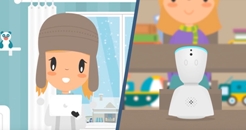 No Isolation robot
No Isolation robot
From an article by Noisolation
72,000 pupils in the UK miss out part of their childhood due to long-term illness. When a pupil can’t attend class in person, AV1 takes their place. AV1 is the distance learning avatar that makes it possible for children and young adults with long-term illness to see, hear and talk to their classmates as if they were there, via an app on their phone or tablet. It becomes their eyes, ears and voice in the classroom
Often, the isolation can be as bad as the illness itself. AV1 is built to let children take part in school activities on their own terms. The child using AV1 can decide when to connect and disconnect, simply by pressing a button in the app. If the child wishes to answer a question, they can raise their hand by pressing a button in the app and a white light will flash on the robots head. AV1 can be put in whisper mode, so only the kids seated next to it will hear them. And if the child is not feeling up for school, he or she can signalise that they want to be passive listeners, and a blue light will flash on the robot's head.
Louise Clancy, Head Teacher at Canbury School, London reported, “AV1 enabled one of my students to take six GCSEs this summer who previously hadn’t been in full time education for years. It’s a marvellous, inclusive device – highly recommend it to all schools.”
The Department for Education are running a pilot to provide continued education for 90 children absent from school due to long-term illness with AV1 robots. These enable the children to virtually attend school, socialise with classmates and remain connected to their home schools and communities. In addition to improving the overall levels of education, the pilot also aims to minimise the impact that school absence can have on a child’s friendships, mental wellbeing and future prospects. Using AV1 will ensure that the child remains an active part of their school community, even if they are being treated outside of their home county, easing the transition of the pupil back into full-time education wherever possible.
Project Lead, Cath Kitchen, says, "Having been involved with alternative provision for nearly two decades, I know firsthand the impact that absence from school can have on a child’s education and mental wellbeing. I hope that the findings from this project will pave the way to providing equal access to education for students with medical and mental health difficulties, enabling them to fulfil their potential."
Speaking on No Isolation’s involvement with the project, Karen Dolva, CEO and Co-Founder of No Isolation, comments: "Our overarching goal is to end involuntary isolation, making sure that no one, irrelevant of age, gender, ability or socio-economic status, ever feels alone."
Watch this 1 min video:
See more here.
Retweet about this article:
From an article by Noisolation, 28/08/2019